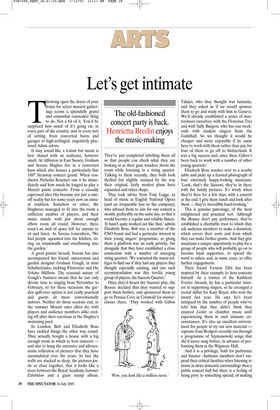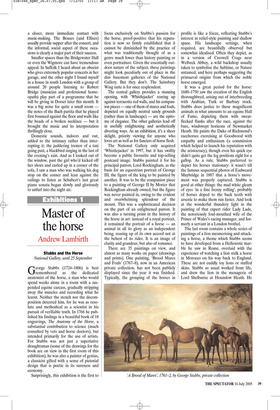Let’s get intimate
The old-fashioned concert party is back. Henrietta Bredin enjoys the music-making
Throwing open the doors of your home for select musical gatherings seems a splendidly grand and somewhat outmoded thing to do. Not a bit of it. You’d be surprised how much of it’s going on, in every part of the country, and in every sort of setting, from converted barns and garages to high-ceilinged, exquisitely plastered Adam salons.
It may sound like a truism but music is best shared with an audience, however small. At Alfriston in East Sussex, Graham and Serena Hughes live in a converted barn which also houses a particularly fine 1887 Steinway concert grand. When conductor Nicholas Kraemer saw it he immediately said how much he longed to play a Mozart piano concerto. From a casually expressed idea this become not just a oneoff reality but for some years now an annual tradition. Somehow or other, the Hugheses managed to fit into the room a sufficient number of players, and their music stands, with just about enough elbow room all round. However, there wasn’t an inch of space left for anyone to sit and listen. As Serena remembers, ‘We had people squashed into the kitchen, sitting on windowsills and overflowing into the garden.’ A good pianist herself, Serena has also accompanied her friend, nurseryman and garden designer Graham Gough, in mini Schubertiades, tackling Iinterreise and Die Schöne Müllerin. The seasonal nature of Gough’s business means that he can only devote time to singing from November to February, so for these occasions the garden spill-over option is not really practical and guests sit more conventionally indoors. Neither do those sessions end, as the summer Mozart ones often do, with players and audience members alike cooling off after their exertions in the Hughes’s swimming pool.
In London, Bob and Elisabeth Boas have tackled things the other way round. They actually bought a house with a big enough room in which to host concerts and also to hang the extensive and idiosyncratic collection of pictures that they have accumulated over the years. In fact the walls are stacked so deep, the pictures jostle so close together, that it looks like a cross between the Royal Academy Summer Exhibition and a giant stamp album. They’ve just completed labelling them all so that people can check what they are looking at as their gaze wanders about the room while listening to a string quartet. Talking to them recently, they both look thrilled but slightly stunned by the way their original, fairly modest plans have expanded and taken shape.
They took advice from Tony Legge, ex head of music at English National Opera (and an irreparable loss to the company), who advised them to aim for one concert a month, preferably on the same day, so that it would become a regular and reliable fixture. ‘It hasn’t quite worked out like that,’ admits Elisabeth Boas. Bob was a member of the ENO board and had a particular interest in their young singers’ programme, so giving them a platform was an early priority, but alongside that they have established a close connection with a number of emerging string quartets. ‘We contacted the music colleges to find out if they had any players they thought especially exciting, and one such recommendation was this terrific young group of players, the Sacconi Quartet.’ Once they’d heard the Sacconi play, the Boases decided that they wanted to support them further, and sponsored them to go to Prussia Cove in Cornwall for masterclasses there. ‘They worked with Gábor Takács, who they thought was fantastic, and they asked us if we would sponsor them to go and study with him in Geneva. We’d already established a series of masterclases ourselves, with the Florestan Trio and with Sally Burgess, who has run weekends with student singers from the Guildhall. So we thought it would be cheaper and more enjoyable if he came here to work with them rather than pay for four of them to go off to Switzerland. It was a big success and, since then, Gábor’s been back to work with a number of other young quartets.’ Elisabeth Boas reaches over to a nearby table and picks up a framed photograph of four extremely happy-looking musicians. ‘Look, that’s the Sacconi, they’re in there with the family pictures. It’s lovely when they’re here for a few days, with a concert at the end. I give them lunch and look after them — they’re incredibly hard-working.’ This is genuine patronage, of the most enlightened and practical sort. Although the Boases don’t pay performers, they’ve established a charitable trust to which they ask audience members to make a donation, which covers their costs and from which they can make further grants. And they give musicians a unique opportunity to play for a group of people who will probably go on to become loyal supporters, to spread the word to others and, in some cases, to offer further engagements.
Their friend Vernon Ellis has been inspired by their example to host concerts himself. As a trustee of the Kathleen Ferrier Awards, he has a particular interest in supporting singers, so he arranged a recital début for Kate Royal, who won the award last year. He says he’s been intrigued by the number of people who’ve told him that they didn’t think they enjoyed Lieder or chamber music until experiencing them in such intimate circumstances. It’s also an excellent environment for people to try out new material soprano Joan Rodgers recently ran through a programme of Szymanowski songs that she’d never sung before, in advance of performing them at the Wigmore Hall.
And it is a privilege, both for performer and listener. Audience members don’t suspend their critical faculties when listening to music in more domestic surroundings than a public concert hall but there is a feeling of being privy to something special, of making a closer, more immediate contact with music-making. The Boases (and Ellises) usually provide supper after the concert, and the informal, social aspect of these occasions is clearly a major part of their success.
Smaller spaces than the Bridgewater Hall or even the Wigmore can have tremendous appeal. In Suffolk I heard about an oboeist who gives extremely popular concerts in her garage, and the other night I found myself in a house in south London with a group of around 20 people listening to Robert Bridge (musician and professional homeopath) play part of a programme that he will be giving in Dorset later this month. It was a big noise for quite a small room the notes of the Bach partita that he played first bounced against the floor and walls like the beads of a broken necklace — but it brought the music and its interpretation thrillingly close.
Domestic sounds, indoors and out, added to the intimacy rather than interrupting it; the juddering tremor of a taxi going past, a blackbird singing in the last of the evening’s rain. And as I looked out of the window, past the girl who’d kicked off her shoes and curled up in a corner of the sofa, I saw a man who was walking his dog stop on the corner and lean against the railings to listen as Schubert’s last great piano sonata began slowly and gloriously to unfurl into the night air.



























































 Previous page
Previous page